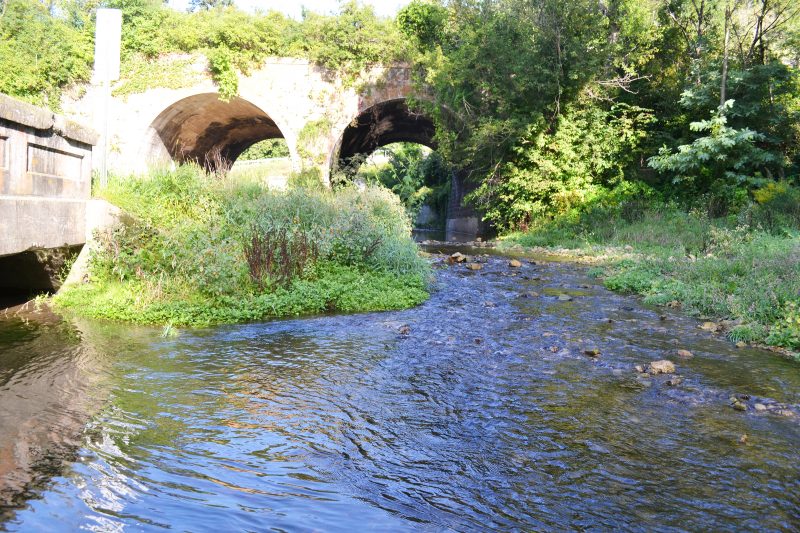LEWISTON, Minn. — Winona County residents are hailing the passage of a comprehensive bill that makes significant changes to the investigation of fish kills in Minnesota. The legislation, which was passed during the recently concluded session of the state Legislature, was pushed by a group of local residents after a series of fish kills in their community. In particular, Land Stewardship Project (LSP) members in Winona County organized around attempting to identify the cause of one specific kill that took place a year ago, but were frustrated by inaction on the part of state agencies. That launched a nearly year-long organizing campaign that culminated in the passage of the bill.
“This is a prime example of how citizens can respond to a major problem in their community by pushing for public policy that protects human and environmental health,” said Nancy Olson-Ventura, a Winona County resident. “Community organizing works. Although this legislation covers all of Minnesota, it should be emphasized over and over that the karst region in the southeastern part of the state is especially sensitive to pollution. This bill is a good first step in the ongoing effort to clean up our waters.”
Implementation of these new rules comes at a time when summer season often becomes fish kill season in areas like southeastern Minnesota. In late July 2022, on Upper Rush Creek south of Lewiston, at least 2,500 fish, mostly brown trout, were found dead. In 2019, 1,500 fish were reported killed in Garvin Brook, just east of Lewiston. In 2021, 250 trout were found dead in Trout Valley Creek, just south of Weaver. And in 2015, one of the most productive trout streams in the state, the South Fork of the Whitewater River that passes to the west of Lewiston, was the site of yet another disaster that was estimated to have killed nearly 10,000 fish. Fish kills can result from numerous manmade sources, including pesticide and manure runoff, and prompt investigations are imperative before evidence is wiped out. In the case of the July 2022 incident, it took nine months to determine that manure runoff after a rainstorm had caused the kill.
“I live about one mile from the massive 2,500 fish kill that happened last summer,” said Richard Ahrens, a retired Winona County beef and crop farmer. “When I was young, there were more farmers and less livestock in our neighborhood, and the water was pure and safe. Today, my well tests at 19 parts per million nitrates, nearly double the health safety limit. State agencies must do more. The response to these fish kills has not met the urgency needed. I am encouraged that this bill creates a protocol for responding to and handling fish kills. I would also hope that in the near future there will be another bill that focuses on penalties and accountability for fish kills.”
The bill:
• Directs the Minnesota Pollution Control Agency (MPCA), Minnesota Department of Natural Resources (DNR), the Minnesota Department of Agriculture (MDA) and Minnesota Department of Health (MDH) to propose and finalize a comprehensive investigation protocol, with a public comment period on the proposal.
• Requires an on-the-ground response from the state within 24 to 48 hours, as well as a more comprehensive list of what samples to collect and what tests to run.
• Strengthens public notices to downstream residents when a fish kill occurs.
• Publishes fish kill occurrences and fish kill investigation reports in the Environmental Quality Board Monitor.
• Directs the MDA, MDH, MPCA and DNR to make recommendations to the Legislature on what laws and regulations need to change to prevent future fish kills from occurring, particularly in the karst region of southeastern Minnesota.
The legislation was authored by Rep. Sydney Jordan (DFL – Minneapolis) and Sen. Jen McEwen (DFL – Duluth). LSP worked on the issue with Minnesota Trout Unlimited, the Minnesota Well Owners Organization, and the Minnesota Center for Environmental Advocacy. As a follow-up to local organizing meetings in Winona County, citizens from southeastern Minnesota and other parts of the state testified at the Legislature in support of the bill, as well as wrote letters and contacted lawmakers directly. In September, they delivered a letter to Gov. Tim Walz’s office calling on state officials to take action in the wake of the rash of fish kills that have occurred in the region.
Lee Stoe, an LSP member and trout angler who regularly fishes in Rush Creek, said that it’s important to recognize that polluted water impacts more than fish health.
“By involving the Department of Health in fish kill investigations, we are helping to protect our residents along with the fish,” he said. “Importantly, this bill lends transparency to an otherwise opaque process by requiring that the investigative protocol, investigation results and proactive suggestions be published by the Environmental Quality Board.”
-30-
